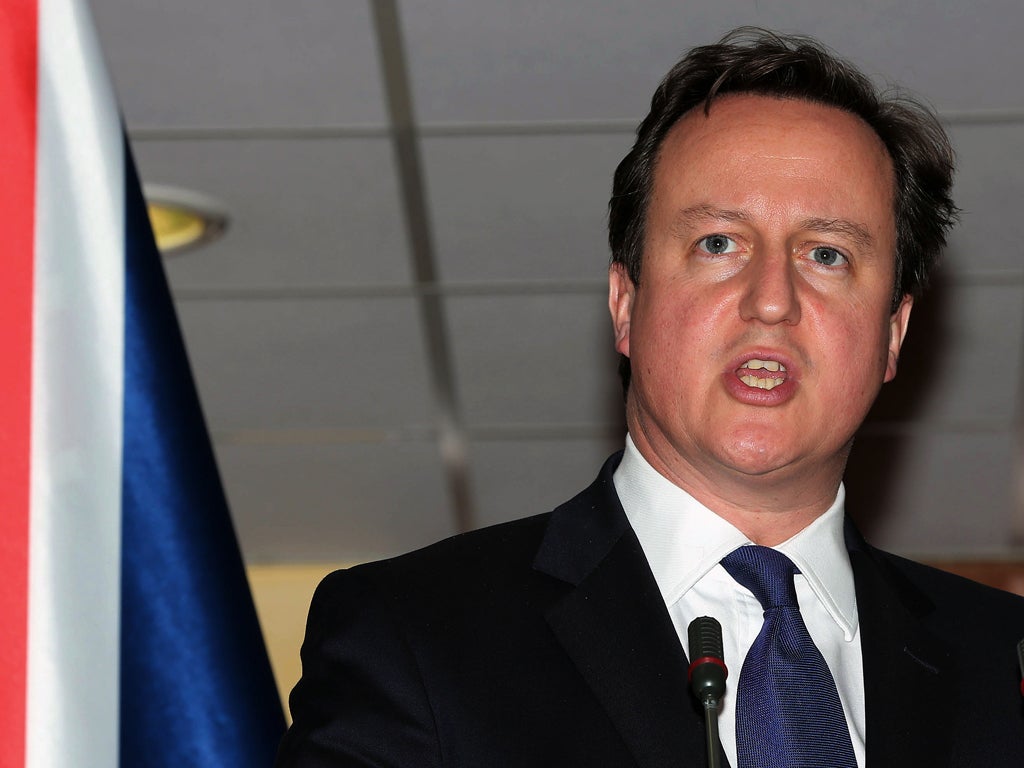Is Cameron a liar? Now for the official verdict
The deceit about paying down the national debt will have been in the script for days if not weeks


Shortly we shall learn whether or not the Prime Minister, David Cameron, is, officially, a liar.
The Office for National Statistics has been asked to sit in judgement. The question concerns Mr Cameron’s statement in a recent party political broadcast that “we are paying down Britain’s debts”. In the Spectator, Fraser Nelson, the editor, called it “astonishingly dishonest”.
In fact, the latest figures show that the national debt is actually rising. Since the Coalition was formed, public sector net debt has expanded from £811.3bn (55.3 per cent of GDP) to £1,111.4bn at the end of December 2012 (70.7 per cent of GDP). The Office for Budget Responsibility has also forecast that public sector net debt will continue to increase and the Government’s target to get it declining by 2015-16 will not be met. Rachel Reeves MP, a Labour front-bench spokesperson, has asked the Director of National Statistics to intervene.
Of course, everybody and their dog knows that politicians lie. That is what people invariably tell polling organisations. It is a major reason why trust in government and the political process are in steep decline. In fact, what the public has noticed is a change, an increase in the volume if you like. Broadly speaking, with exceptions, until the 1990s government ministers deliberately told untruths only when they believed the interests of the state so demanded. You couldn’t say that you were thinking of devaluing the pound during the era when exchange rates were fixed in case you set off a destablising foreign exchange run. In international relations, where there is no rule of law, nations have always lied to one another. Britain has been known as “perfidious Albion” for many centuries.
Two things changed. In the first place, professional politics became primarily a non-stop marketing exercise designed to acquire and retain power. From the morrow of victory or of defeat at a general election, your party had always to be presented as better than it was and your opponents as worse. This required “spinning” and deception if not outright lies. Second, the Labour Party, having suffered four election defeats in a row, three at the hands of Mrs Thatcher and one to John Major, became desperate. At the same time, the media had become very casual with the truth.
The best account of this transition from mostly honest politics to mostly dishonest is Peter Oborne’s The Rise of Political Lying, published in 2005, a classic text. He wrote that Britain now lives in a post-truth environment. Public statements are no longer fact-based but operational. Realities and political narratives are constructed to serve a purpose, dismantled, and the show moves on. “In recent years, mendacity and deception have become an entrenched feature of the British system. It began with the Major government and was developed by New Labour.” This moved Trevor Kavanagh, political editor of the Sun, to write without fear of contradiction: “The Rt. Hon Peter Mandelson, minister of the Crown, member of the Privy Council, is a natural born liar. Deceit is second nature to him – a tried and tested weapon in his political armoury.”
This is how ministerial lying often happens. The prime minister, or a minister, is answering questions in the House of Commons, or responding to interventions, or taking part in an interview. They are conscious that their statements are part of a marketing narrative and must play their allotted role.
So, to give an example, when Mr Blair as Prime Minister was being criticised for putting Railtrack into administration, he asserted that “the longer the administrator’s work has gone on, the more financial difficulties he has uncovered”. It sounded plausible. It was the Prime Minister speaking, it must be true. It served Mr Blair’s purpose in showing that nationalisation of a sort couldn’t be avoided. Except that the Prime Minister had made the whole thing up. The administrator later told a Parliamentary Committee that Railtrack had been operating roughly in line with budgets. There had been no “hidden nasties”.
Mr Cameron’s case is more shocking. For a party political broadcast is a deliberate act, not something said on the spur of the moment. Every word and every image is carefully considered. The deceit about paying down the debt will have been in the script for days or even weeks. The Prime Minister, too, is better placed than almost anyone to know what the truth actually is. And likewise the Chancellor, Mr Osborne, who also has the exact numbers, must surely have seen the text given that the Tories think he is a political genius.
Has it really come to this? Has the Prime Minister of the day solemnly addressed the British people and deliberately, coldly, with aforethought, told them a downright lie? If so, what scorn for the electorate that implies. What insufferable arrogance. What a debauchery of the poor old country’s political system. I wait, fearful, for the verdict.

Join our commenting forum
Join thought-provoking conversations, follow other Independent readers and see their replies